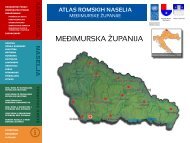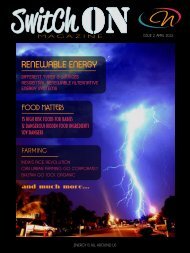You also want an ePaper? Increase the reach of your titles
YUMPU automatically turns print PDFs into web optimized ePapers that Google loves.
UNITED KINGDOM<br />
<strong>Organic</strong> Statistics 2011<br />
The total area of organic land in the UK has shown a decrease of 9 %<br />
The Department for Environment, Food and Rural Affairs has published the latest national<br />
statistics for the UK. The total area of organic land in the UK has shown a decrease of 9 %<br />
between 2010 and 2011 to 656,000 hectares. The cereals area has seen a similar decrease of 8 % to 52,000<br />
hectares, while the vegetables area (including potatoes) has shown a slightly larger decrease of 13 % over<br />
the year to 16,000 hectares. Temporary and permanent pasture land make up the majority of organic land<br />
and therefore drive the change between 2010 and 2011, with temporary pasture showing a decrease of 7<br />
% to 116,000 hectares and permanent pasture decreasing by 9% to 435,000 hectares.<br />
The number of organic producer / processors has fallen again (by 5%) to around 6,900 at the<br />
end of 2011. There was mixed news for the livestock sector. The sheep sector showed an<br />
increase of 18 % to 1,162,000 head, mainly due to large numbers of Welsh operators becoming fully<br />
organic. <strong>Organic</strong> pig numbers rose by 11 % to 53,000 head. <strong>Organic</strong> poultry numbers showed a large<br />
decrease of 27 % to 3 million in 2011 as high feed and energy prices continue to increase the pressure on<br />
producers. Cattle numbers for the UK have fallen by 4 % to 335,000 head. More information is available<br />
here: http://www.defra.gov.uk/<br />
GMO Free Europe Conference 2012<br />
The 7th European Conference of GMO free regions will<br />
take place in Brussels on 4 and 5 September 2012.<br />
Six years after the first GMO free regions conference in Berlin, the movement is stronger than<br />
ever. The entry of the German federal states Thuringia and North-Rhine Westphalia into the<br />
European Network of GMO free regional governments are examples for this trend.<br />
Central topics of this year’s conference will be the upcoming seed legislation and the<br />
right to a national ban of GMO cultivation, the import of GM soy in connection<br />
with the approaching European CAP reform and the deficient risk assessment of GMO by the European<br />
Food Safety Authority (EFSA). The preliminary program is available here. Registration is possible here.<br />
Registration deadline is 22 August 2012.<br />
Source<br />
ISSUE II 43






